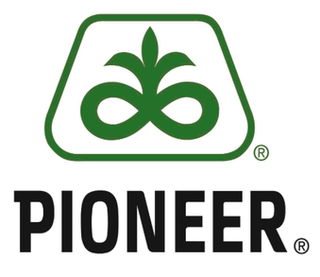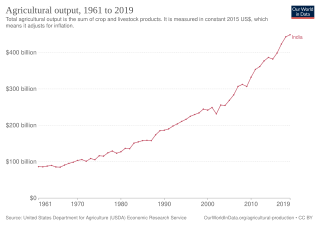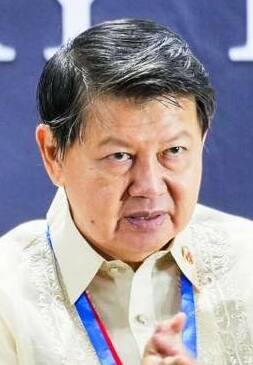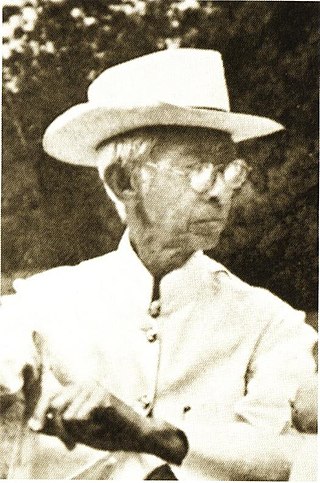
The Green Revolution, or the Third Agricultural Revolution, was a period of technology transfer initiatives that saw greatly increased crop yields. These changes in agriculture began in developed countries in the early 20th century and spread globally until the late 1980s. In the late 1960s, farmers began incorporating new technologies such as high-yielding varieties of cereals, particularly dwarf wheat and rice, and the widespread use of chemical fertilizers, pesticides, and controlled irrigation.

Chinese Filipinos are Filipinos of Chinese descent with ancestry mainly from Fujian, but are typically born and raised in the Philippines. Chinese Filipinos are one of the largest overseas Chinese communities in Southeast Asia.
SLAC most often refers to SLAC National Accelerator Laboratory, at Stanford University.

Pioneer Hi-Bred International, Inc. is a U.S.-based producer of seeds for agriculture. They are a major producer of genetically modified crops with insect and herbicide resistance.

Philippine Rice Research Institute (PhilRice) is a government corporate entity attached to the Department of Agriculture created through Executive Order 1061 on November 5, 1985 to help develop high-yielding and cost-reducing technologies for farmers.

The history of agriculture in India dates back to the Neolithic period. India ranks second worldwide in farm outputs. As per the Indian economic survey 2020 -21, agriculture employed more than 50% of the Indian workforce and contributed 20.2% to the country's GDP.

Hybrid rice is a type of Asian rice that has been crossbred from two very different parent varieties. As with other types of hybrids, hybrid rice typically displays heterosis or "hybrid vigor", so when grown under the same conditions as comparable purebred rice varieties, it can produce up to 30% more yield. To produce hybrid seeds in large quantity, a purebred sterile rice variety is fertilized with fertile pollen from a different variety. High-yield crops, including hybrid rice, are one of the most important tools for combatting worldwide food crises.

Agriculture in Colombia refers to all agricultural activities, essential to food, feed, and fiber production, including all techniques for raising and processing livestock within the Republic of Colombia. Plant cultivation and livestock production have continuously abandoned subsistence agricultural practices in favour of technological farming resulting in cash crops which contribute to the economy of Colombia. The Colombian agricultural production has significant gaps in domestic and/or international human and animal sustenance needs.

Agriculture in Israel is a highly developed industry. Israel is an exporter of fresh produce and a leader in agricultural technologies. The southern one-half of Israel is desert and irrigation is required for growing crops. The northern one-half is more conducive to rain-fed agriculture. According to the World Bank, 29.7 percent of Israel is agricultural land. The shortage of water is a constraint. In 2008, agriculture represented 2.5% of total GDP and 3.6% of exports. Israel is not self-sufficient in growing food. In 2021, Israel's agricultural imports totaled 8,791 million and agricultural exports totaled 2,445 million dollars. Grains, oilseeds, meat, coffee, cocoa, and sugar were among the imports.

Rice production in China is the amount of rice planted, grown, and harvested for consumption in the mainland of China.
Sterling Paper Products Enterprises also simply known as Sterling or "Orions", is a Philippine school and office supplies and food packaging manufacturing company founded by Lim Seh Leng, father of Henry Lim Bon Liong. It is known as a smooth and high quality paper in a reasonable price.

Henry Lim Bon Liong was a Filipino businessman who was the chief executive officer of Sterling Paper Group of Companies, S.P. Properties, Inc., SL Agritech Corporation and was a member of the governing council of the Philippine Council for Agriculture, Forestry, and Natural Resources Research and Development (PCARRD) from 2005 to 2007.

Perennial rice are varieties of long-lived rice that are capable of regrowing season after season without reseeding; they are being developed by plant geneticists at several institutions. Although these varieties are genetically distinct and will be adapted for different climates and cropping systems, their lifespan is so different from other kinds of rice that they are collectively called perennial rice. Perennial rice—like many other perennial plants—can spread by horizontal stems below or just above the surface of the soil but they also reproduce sexually by producing flowers, pollen and seeds. As with any other grain crop, it is the seeds that are harvested and eaten by humans.

G. V. Chalam, also known as Guduru Venkata Chalam (1909–1967), was an Indian activist and agricultural scientist who received the Padma Shri in 1967.

Pakistan holds a significant position in the global rice market and is one of the leading rice-producing countries. The rice sector is crucial for the country's economy, providing livelihoods to a substantial portion of the population and contributing substantially to agricultural exports.
Costa Rican agriculture plays a profound part in the country's gross domestic product (GDP). It makes up about 6.5% of Costa Rica's GDP, and 14% of the labor force. Depending upon location and altitude, many regions differ in agricultural crops and techniques. The main exports include: bananas, pineapples, coffee, sugar, rice, vegetables, tropical fruits, ornamental plants, corn, potatoes and palm oil.
RiceTec Inc. is a private American company based and headquartered in Alvin, Texas, that develops and produces hybrid rice seed for the American and various international markets. RiceTec previously owned the consumer brand name RiceSelect which markets Texmati brand rice in grocery stores throughout North America. The company was founded in 1990 as a foreign for profit corporation and is owned by the Prince of Liechtenstein Foundation.

Telangana is one of the fastest-growing states in India posing average annual growth rate of 13.90% over the last five years. Telangana's nominal gross state domestic product for the year 2024-25 stands at ₹13.59 lakh crore. Service sector is the largest contributor to the Telangana's economy with a share of about 65% in the year 2018-19. Growth in services has largely been fuelled by IT services with the State holding leading position in IT & ITeS in the country in terms of production and exports.

Prince Sithiporn Kridakara is known as Thailand's Farmer Prince who was awarded the 1967 Ramon Magsaysay Award for Public service for his efforts in the development of Thai agriculture. While serving as chairman of the International Rice Commission, he was instrumental for the establishment of the International Rice Research Institute in Los Baños, Laguna in the Philippines.

Rice production in Myanmar accounts for approximately 43% of total agricultural production in the country, making it the seventh largest producer of rice in the world. Out of 67.6 million hectares of land, 12.8 million are used for cultivation. In 2019 alone, Myanmar accounted for 13,300 million metric tons of milled rice production.
















